If your elderly family member isn’t getting enough protein, she might start to lose too much muscle tone. She may also experience other health issues. Other than meat, poultry, and fish, there are other ways to get more protein into your senior. In-home care providers can help with that too.
Look for Ways to Add Beans to Dishes

Beans contain a huge amount of protein and other essential nutrients. There are lots of dishes that include beans, of course, but there are also ways that you might be able to incorporate beans into dishes that maybe don’t traditionally contain them. Pureeing beans means that you’re able to add them into things like pasta sauce without overpowering the dish with bean flavor.
Swap a Glass of Water for a Glass of Milk
Water is vital for your elderly family member, but there are other ways for her to hydrate. With a glass of milk instead of a glass of water, your senior is able to hydrate, but she also gets vitamin D, calcium, and protein. If drinking milk is the easiest way for her to add protein, you might swap it out for water more than once a day.
Add Cheese to Sandwiches, Wraps, and Salads
Cheese is also high in protein, and it can be a great addition to salads, wraps, and sandwiches. Just a slice or two, or a quarter cup of shredded cheese, offers protein and flavor. Cheese can be high in sodium, so it’s important to factor that in if your senior’s doctor has recommended that she limit her salt intake.
Add an Egg to Wraps, Salads, and Sandwiches
Just one egg has six grams of protein. Hardboiled eggs are fantastic to keep around for snacks, but they’re also easy to add to other foods, just like cheese is. Even making a fast egg salad for a cool lunch can be a great way to get plenty of protein and to stay cool in the heat of summer.
Choose Mixed Nuts for Snacks
Mixed nuts are something your senior needs to consider in her diet if she has no allergies or other reasons not to include them. They’re high in protein, which is great news, but they’re also high in healthy fats that your senior’s brain and body each need. Including just a handful of nuts a day can make a big difference.
In-Home Care Providers can Step in to Help
Nutrition is hard to keep up with on her own, especially if your senior has other demands on her time and attention. In-home care providers can take over meal planning for your senior, especially with an eye toward maximizing her daily protein intake. That allows your senior to focus on what she wants to focus on while still ensuring she’s getting the protein she needs.
